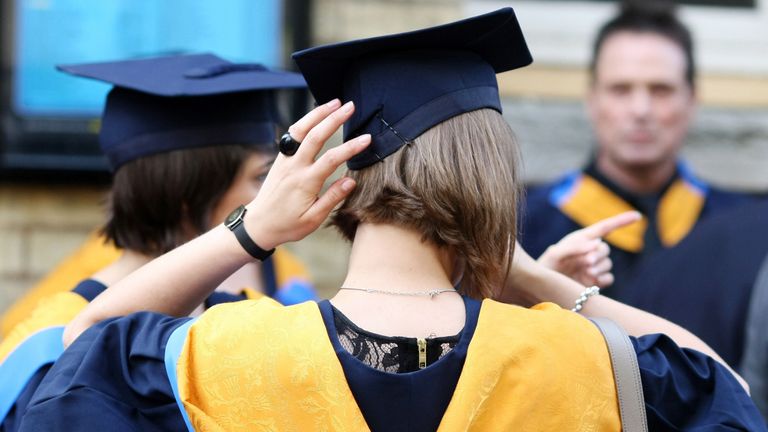University admissions shake-up may mean students can only apply with final grades
Students may have to wait to receive their full grades before getting a place at university.
Friday 13 November 2020 18:17, UK
The education secretary is considering changes to the university admissions system that could see students receive offers only once they have their final grades.
Gavin Williamson says the changes in England would "remove the unfairness" that some students face due to inaccurate predicted grades.
Under the current scheme, students are offered conditional or unconditional offers based on their AS-level results and predictions for A-level results.
But the Department for Education (DfE), which is headed by Mr Williamson, says unconditional offers are not always in the best interests of students as it can leave them unprepared for the amount of studying required at university.
It comes after the examination scandal in the summer where thousands of applicants lost their places at university when the government used an algorithm system to give final grades to youngsters who were unable to sit their exams due to COVID-19.
The government later announced it was U-turning on the controversial move following widespread criticism and protests from youngsters. Students ended up being awarded grades based on predictions set by their teachers.
The announcement backs the suggestion from Universities UK (UUK), which represents vice-chancellors, and UCAS (Universities and Colleges Admissions Service), the organisation that heads up the application process for students.
Both institutions said the post-qualification admissions system (PQA), if it were to go ahead, would be rolled out in just three years' time. Applications for the 2021 intake will not be affected by the proposals, the DfE has said.
A consultation is due to be launched in the coming months to discuss the proposed changes, as well as reviewing the use of personal statements, which are around 500 words long and are included in the applications. They list the students' ambitions, skills, and experience to university and college admissions staff.
Schools, colleges, and universities are being invited to voice their opinions on the suggestions.
Research has revealed that state school pupils do not receive the same support as their private school counterparts when writing the statements, and therefore are at lesser advantage in the selection process.
Mr Williamson said it was worth "celebrating" that there are record numbers of disadvantaged students going to university, but the system in its current form is "letting down the brightest pupils from the most disadvantaged backgrounds".
"By using predicted grades it is limiting the aspirations of students before they know what they can achieve. We need to radically change a system which breeds low aspiration and unfairness," he said.
"That is why we are exploring how best to transform the admission process to one which can propel young people into the most promising opportunities for them within higher education.
"It has been a challenging time for the education sector, but COVID-19 will not stop this government from levelling the playing field and empowering students to have the very best opportunities to succeed."
Lee Elliot Major, professor of social mobility, University of Exeter, said: "Applying to university with actual A-level grades is a reform that would enhance social mobility as it would sweep away the barriers, from poor advice to low expectations, that for too long have stymied the prospects of poorer students."






